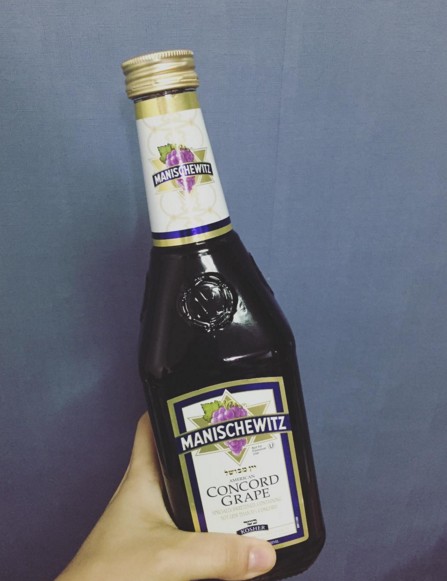
No matter what kind of seder I’m hosting or attending, be it Upper West Side formal, Crown Heights casual or Bushwick non-traditional, I bring Manischewitz. For those unfamiliar with Manischewitz, let me explain: it’s a kosher concord wine that costs $5-7.99 at any given liquor store, and it’s usually on the bottom shelf alongside Taylor Sherry and a Sangria mixer. (You’ll understand this strategic store placement once I tell you about how it tastes.) Bringing Manischewitz to a seder is like bringing guacamole to a BBQ: not essential to the occasion, but hastily consumed anyway.
Manischewitz tastes like Welch’s Grape Juice meets Port meets the blood of our forefathers; there’s definitely something “afflicted” in the flavor. At 11 percent ABV, it’s the kind of sticky sweet wine that gets glugged like juice at the dinner table, resulting in a collective morning-after headache for everyone involved.
All the same, Manischewitz is ingrained in Jewish culture. So much so, in fact, that there’s even an expert on it. And I decided to ask him why, despite its cloying sweetness, hangover-inducing notoriety and a bevy of better options, Jews still deign to have Manischewitz at the seder table.
___________
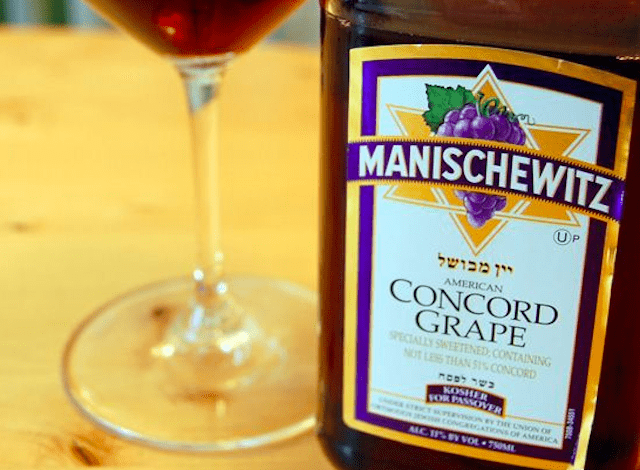
Personally, I like the flavor of Manischewitz. But to many others, the taste is insufferable. It’s more of a long-running inside joke among Jews: a weird bullshit booze that we love to hate, but secretly also love to love for two days a year.
Wine does play a significant role at the seder table, mind you. Cups are ceremonially filled, drunk and refilled with haste so many times throughout the beginning prayers that before the meal, most everyone is a little sauced.
But in order to understand my complex attraction (she can’t get off the drink!) to this particular wine, I turned to kosher guru Roger Horowitz for answers. Horowitz is an American historian and food expert, and a director of programming at the Hagley Museum and Library in Wilmington, Del. His recently published book, Kosher USA, explores how modern foods earned a kosher certification and, consequently, a more prevalent role in Jewish culture and life. He recently gave a talk at the Brooklyn Historical Society about Manischewitz, so I figured he was the guy to talk to.
________

“In the case of Manischewitz, it’s an imagined ritual,” Horowitz explained. “It’s something that we’ve created. It’s not rooted in the Passover seder itself.”
He went on to say, however, that “Manischewitz has always marketed itself to Jews on the basis of tradition,” using labels such as “Like Mother Used to Make” in order to draw in consumers.
The “tradition” that he’s referring to was that of home winemaking in families, a prohibition-era solution to the scarcity of sacramental wine. Concord grapes were easily obtained from upstate New York, mashed and sugared, and cellar-fermented for a few months to be ready in time for the holidays. “It’s very much connected with the Passover ritual. And the fact that you [love Manischewitz] today is the success of that tradition.”
Here’s the thing I remained unclear on: drier and better tasting kosher wine is widely available for any seder table. At best, Manischewitz is a nod to the past. We’re a long way from prohibition now — why do we keep going back to this crappy juice wine?
__________
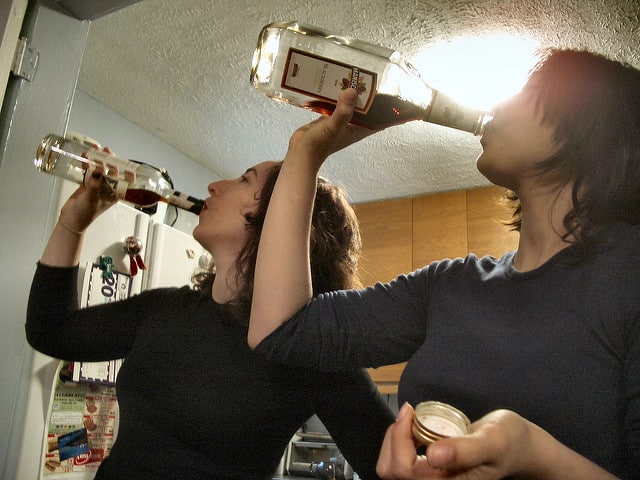
Again, Horowitz came back to the notion of tradition.
“The Jews’ focus is on tradition. So that’s what they sell, that’s what it’s about,” he said. “And I don’t think the appeal for Jews has changed that much. This is the taste that we associate with the Passover seder.”
That much I understand. Like having popcorn at the movies, I never feel right having seder without Manischewitz.
“It’s tradition all the way, and that tradition is limited,” Horowitz added. “I think Manischewitz continues as tradition. I don’t see it breaking out and becoming a wine on the scale that it once was. It’s especially gonna be strong with Jews who grew up with parents and relatives having Manischewitz.”
So, do Horowitz’ kids and grandkids like Manischewitz?
“Oh no, they think it’s terrible,” he said.
I told Horowitz about Brooklyn’s new artisanal matzo, and asked him whether the “tradition” of Manischewitz might one day have a place outside the seder. But he felt its future would be purely ceremonial.
__________
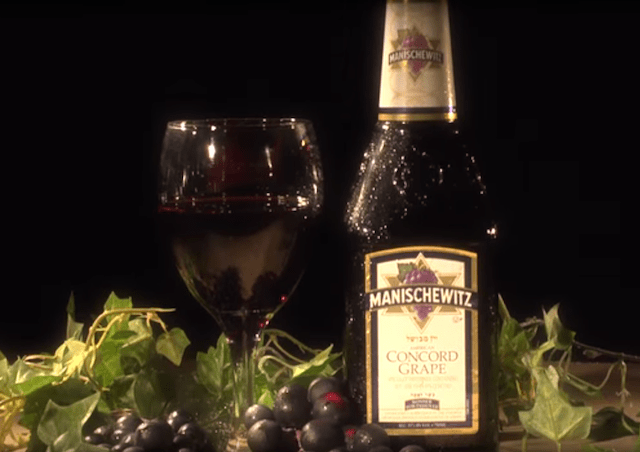
“I think that kosher producers would wish that you could have this kind of crossover,” he said. “[They’d] love to see matzo become a cracker. I have Matzo around year-round because it’s a great cracker, it is great for that. But kosher wine is very hard for crossover.”
(FYI, he doesn’t really like the stuff either. He told us he only has it around on Passover, and that he “wouldn’t be inclined to have it other than for ritual.”)
If I do decide to have kids, I’m excited about the prospect of introducing them to Manischewitz, even if the tradition I’m passing down is more of an “imagined ritual” than it was for my parents’ generation. For me, putting Manischewitz on the seder table is like using yiddish slang in every day conversation. It’s a celebration of cultural Judaism, a Judaism that can be observant but liberated from religious gravitas.
Part of seder, after all, is just talking. Talking about tradition, about who we are and what all this stuff means to us today. And hey, maybe the answer is “nothing.” But at least we’re saying “nothing” around a table filled with good friends and family over a bottle of ridiculously cheap, hangover-inducing wine. And that, kids, is enough for this Jew in 2016.
Follow Sam on her path to righteousness: @ahoysamantha
4 Comments
Leave a Reply

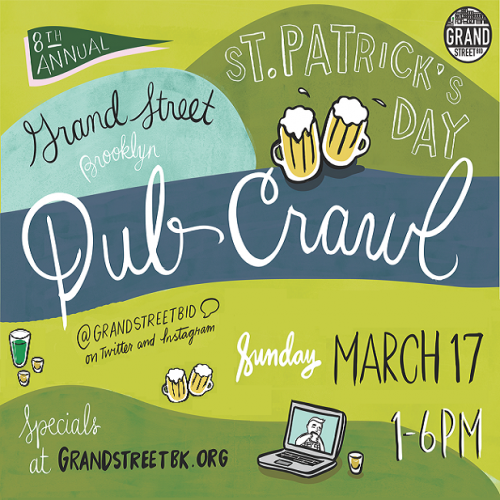
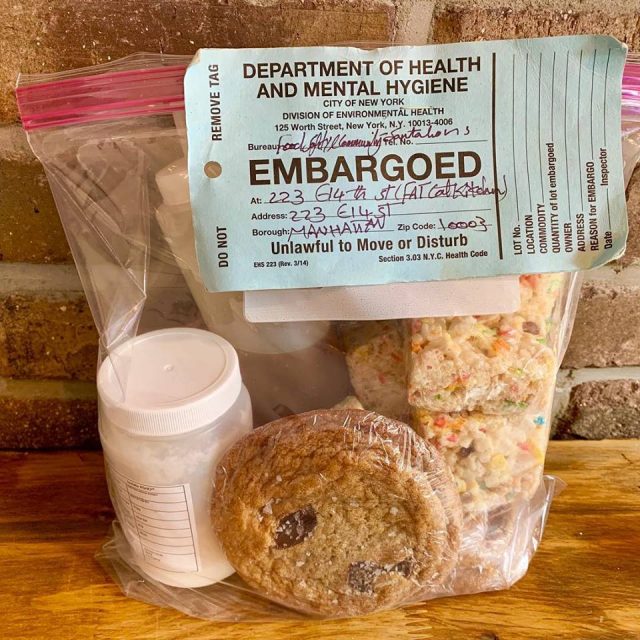

I love this wine but its not easy to get where I am located
I love this wine and I am 100 percent Italian.
I still drink this brand since 1974 (became if legal age) and I particularly enjoy the BlackBerry blend. I’m really glad it’s still around, plus, it makes a great Spritzer!!
My wife and I are fascinated. This wine is the best. Greetings from Costa Rica!